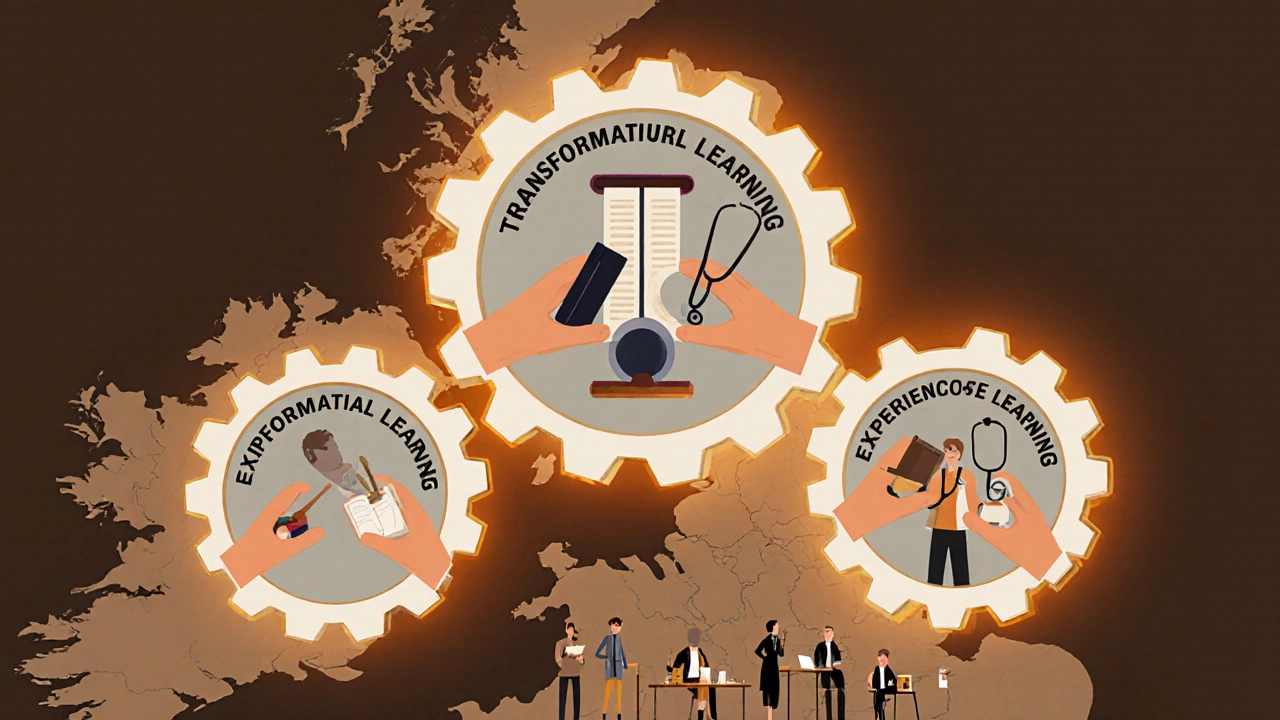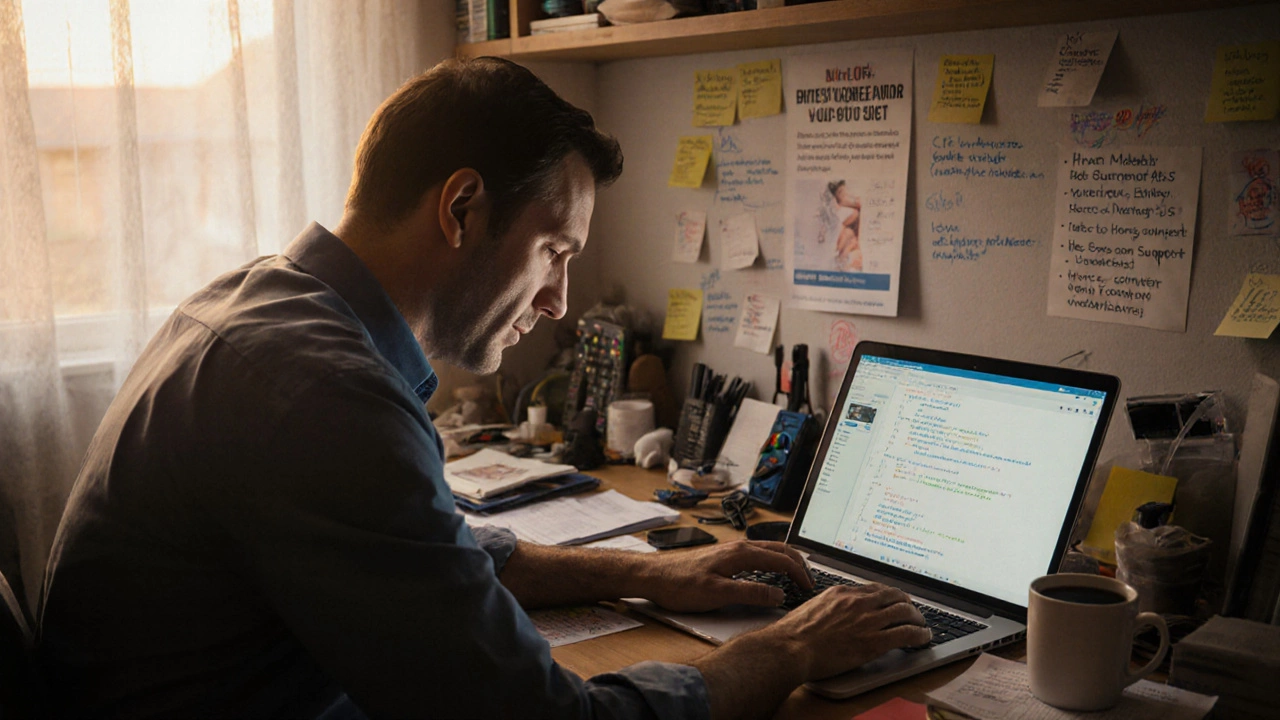When you’re an adult going back to school, changing careers, or learning a new skill on the job, you don’t learn the same way you did in high school. That’s not because you’re slower or less capable-it’s because your brain works differently. Adult learning theory explains why. One of the clearest examples? Andragogy, developed by Malcolm Knowles in the 1970s.
Andragogy: The Most Common Example of Adult Learning Theory
Andragogy isn’t just a fancy word. It’s a practical framework that describes how adults learn best. Unlike children, who often rely on teachers to tell them what to learn and how, adults need to understand why something matters before they invest time in it.
Think about someone in their 40s deciding to learn basic coding to move into a tech support role. They’re not doing it because their boss said so. They’re doing it because they saw a job posting that required it, they know it’ll increase their salary, and they’ve tried to fix their own computer problems and hit walls. That’s andragogy in action: self-directed, goal-oriented, and tied to real-life problems.
Knowles identified six key principles behind andragogy:
- Adults need to know why they’re learning something
- They learn best when they can connect new information to past experiences
- They’re motivated by solving immediate problems, not abstract theory
- They want control over their learning path
- They respond better to internal motivation than external rewards
- Learning should be practical, not theoretical
These aren’t just ideas-they’re why online platforms like Coursera and LinkedIn Learning work so well for adults. You pick the course. You set the pace. You choose the project that solves your real problem. That’s not luck. That’s andragogy designed into the product.
How Adult Learning Theory Plays Out in Real Life
Take Maria, a nurse in her late 30s working night shifts in a Dublin hospital. She wants to become a clinical educator but doesn’t have the formal qualifications. Her employer offers a part-time certificate program. It’s not a traditional classroom. Instead:
- She gets case studies from her own unit to analyze
- She records short videos explaining procedures to new staff
- She meets once a month for group discussions, not lectures
- Her final assignment is designing a training module for new nurses
This isn’t just good teaching. It’s adult learning theory applied perfectly. Maria isn’t memorizing facts for a test. She’s building skills she can use tomorrow. The theory says adults learn by doing, and this program makes that happen.
Compare that to a traditional college course where students sit in rows, listen to a professor, and take exams weeks later. That works for 18-year-olds fresh out of school. It doesn’t work for adults with jobs, kids, and deadlines.

Other Examples of Adult Learning Theories
Andragogy is the most widely known, but it’s not the only one. Other theories offer different angles on how adults learn.
Transformative Learning Theory, by Jack Mezirow, looks at how adults change their worldview. Imagine a manager who always believed leadership meant giving orders. After taking a course on emotional intelligence, they start listening more, asking questions, and mentoring. That shift in belief? That’s transformative learning. It’s not about gaining a new skill-it’s about changing how you see the world.
Self-Directed Learning is another big one. It’s what happens when an adult takes full responsibility for their learning. Think of someone learning Spanish using Duolingo every morning before work, watching Spanish films on weekends, and joining a local language exchange. No teacher. No schedule. Just them and their goal.
Experiential Learning, based on David Kolb’s model, says adults learn through a cycle: experience, reflection, conceptualization, and experimentation. A carpenter who learns a new joinery technique by trying it, seeing what went wrong, reading up on the method, then testing it again on a real project? That’s experiential learning in motion.
These theories aren’t competing. They’re layers. Most adult learners use a mix of them without even realizing it.
Why Most Training Programs Fail Adults
Companies spend billions on employee training every year. Yet studies show over 60% of what’s learned is forgotten within a week. Why? Because they treat adults like students.
Think of mandatory compliance training that’s a 30-minute video you have to sit through. No interaction. No relevance. No way to apply it. It’s not just boring-it’s useless. Adults don’t learn by being told. They learn by doing, reflecting, and connecting.
Good adult learning programs avoid these mistakes:
- They start with the learner’s problem, not the curriculum
- They give choices: which module to do first, what project to work on
- They build in time for reflection and peer discussion
- They connect learning to real outcomes, like promotions or better performance reviews
One credit union in Cork redesigned its customer service training after realizing staff were skipping modules. Instead of a lecture, they created role-play scenarios based on actual complaints. Staff picked the scenarios they wanted to tackle. They practiced in small groups. They got feedback from peers. Completion rates jumped from 45% to 92%.

How to Apply Adult Learning Theory in Your Own Learning
Whether you’re studying for a certification, learning a new software tool, or trying to pick up a language, you can use adult learning theory to make it stick.
Here’s how:
- Ask yourself: Why am I doing this? Write down your real reason-not what you think you should say.
- Connect it to something you already know. If you’re learning Excel, think about how it’ll help you track your household budget or manage your freelance invoices.
- Choose learning that lets you do something. Look for courses with projects, not just videos.
- Find a community. Join a forum, a study group, or even a Facebook group of others learning the same thing.
- Teach someone else. Even if it’s just explaining a concept to a friend. Teaching forces you to understand it deeply.
Adult learning isn’t about how smart you are. It’s about how you connect the dots. The more you tie learning to your life, the more it sticks.
What to Look for in an Adult Learning Program
If you’re choosing a course, workshop, or training program, don’t just look at the price or the certificate. Ask these questions:
- Does it start by asking me what I want to achieve?
- Can I choose the order or pace of the material?
- Is there a chance to apply what I learn right away?
- Will I be working with other adults, not just watching a lecture?
- Does it value my experience, or treat me like a blank slate?
If the answer to most of these is no, it’s probably not designed for adults. It’s designed for compliance.
Good programs treat you as a partner, not a recipient. They respect your time, your experience, and your goals. That’s the heart of adult learning theory.
What is the most common example of adult learning theory?
The most common example is andragogy, developed by Malcolm Knowles. It’s the theory that adults learn best when they understand why they’re learning something, can connect it to their life experience, and have control over their learning process. It’s why platforms like Coursera and LinkedIn Learning work so well for adults-they’re built around self-direction and real-world application.
How is adult learning different from child learning?
Children often learn because they’re told to-following a set curriculum, memorizing for tests, and relying on teachers for direction. Adults learn because they need to-whether it’s for a job, a personal goal, or solving a problem. They want relevance, autonomy, and immediate use. They don’t learn well when information is abstract or forced.
Can adult learning theory help me learn a new language?
Absolutely. Instead of just memorizing vocabulary lists, focus on using the language to solve real problems-like ordering food in a restaurant, reading a manual for your new appliance, or chatting with a native speaker online. Connect each phrase to a situation you’ll actually use it in. That’s experiential learning in action. Apps like Duolingo help, but real progress comes when you use the language for something that matters to you.
Why do adult learners quit courses?
Most quit because the course doesn’t respect their time or experience. If it’s too theoretical, too slow, or feels like school again, adults lose motivation. They’re not lazy-they’re busy. If the learning doesn’t feel useful or relevant right away, they move on. The best courses make learning feel like a tool, not a chore.
Is andragogy the only adult learning theory?
No. Other theories include transformative learning (changing how you see the world), self-directed learning (taking full control of your learning), and experiential learning (learning by doing and reflecting). Most adult learners use a mix of these without realizing it. Andragogy is the most well-known, but it’s not the whole picture.
If you’re learning something new as an adult, remember: your experience isn’t a barrier-it’s your advantage. The best learning doesn’t happen in a lecture hall. It happens when you connect knowledge to your life, your goals, and your reality.
